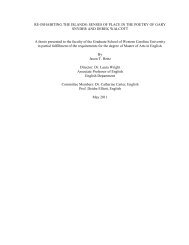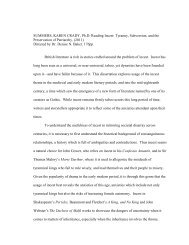HINSON, DANIEL ROSS, DMA Are You Serious? - The University of ...
HINSON, DANIEL ROSS, DMA Are You Serious? - The University of ...
HINSON, DANIEL ROSS, DMA Are You Serious? - The University of ...
Create successful ePaper yourself
Turn your PDF publications into a flip-book with our unique Google optimized e-Paper software.
eference to commedia dell’arte. Don Alfonso, the buffo bass, is a jaded old philosopher and<br />
bears resemblance to the wily “Scaramuccio.” It is he who challenges the young <strong>of</strong>ficers to this<br />
test <strong>of</strong> lover’s fidelity. He is the puppeteer, and they the marionettes. <strong>The</strong> other buffa character,<br />
the cynical and resourceful soubrette Despina, wears a variety <strong>of</strong> masks through the course <strong>of</strong> the<br />
opera, first as herself, the malcontent servant-girl, who again bears resemblance to the coquettish<br />
“Colombina.” Later, she appears as the bogus magnetic medico, “Graziano,” and later still as the<br />
droning notary, “Tartaglia.”<br />
<strong>The</strong> mezzo carattere are Dorabella and Guglielmo; these characters have elements <strong>of</strong> both<br />
seria and buffa. “As in Don Giovanni and Le nozze di Figaro, Mozart has sharply differentiated<br />
between types <strong>of</strong> soprano in Così fan tutte, making a distinction between temperaments as well<br />
as between classes.” 28 Dorabella is the lower voiced, and certainly more capricious <strong>of</strong> the two<br />
sisters. Surprisingly, it was she who in her seria aria, “Smanie implacabili,” complains most<br />
loudly that she will die without her Ferrando. One must “recognize that Dorabella is indulging<br />
her emotions and that she is about to sing an extravagant aria <strong>of</strong> frenzied grief, more suited to<br />
Electra in Idomeneo than to a frivolous young lady in a comic opera. <strong>The</strong> effect is absurd and<br />
raises smiles <strong>of</strong> amusement.” 29 Of course, the lady doth protest too much, and a few hours later,<br />
she discards her plaints and readily succumbs to seduction without the flourish.<br />
Guglielmo, the baritone, is always engaging in some form <strong>of</strong> competition with his<br />
compatriot Ferrando. This is apparent in the very first scene, when they give their word <strong>of</strong> honor<br />
to keep the wager a secret. Ferrando swears “Tutto” (everything), and Guglielmo says<br />
28 Charles Osborne, <strong>The</strong> Complete Operas <strong>of</strong> Mozart (New York: Da Capo, 1978), 288.<br />
29 Mann, 536.<br />
33

















